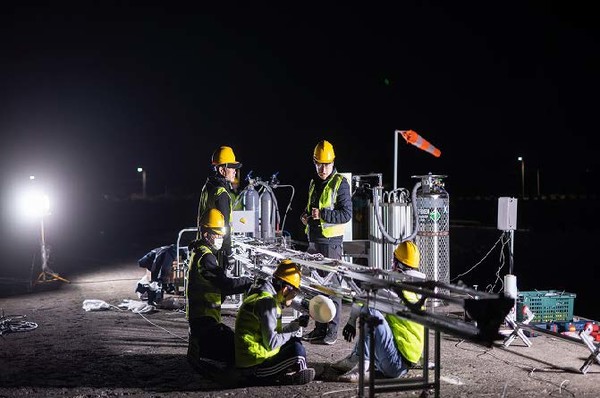On April 11, KAIST announced that its third rocket launch attempt on March 24 had been successfully completed. This launch was held in Jeju Island in cooperation with the rocket startup Perigee Aerospace as part of a project known as Blue Whale 0.1 (BW-0.1)

The startup was founded by Yoon Shin, a student from the Department of Aerospace Engineering, who aims to develop the smallest launch vehicles for space. They believe that Small Launch Vehicles (SLV) can make spaceflight “easier, more affordable, and […] truly sustainable.” The final goal of the Blue Whale project, BW 1.0, aims to carry 50 kg worth of payloads from low Earth orbit (at approximately 500 km) to space for commercial use.
In its course to the BW 1.0, Perigee is working on three preceding projects. BW-0.1 was one of them, jointly conducted with KAIST to commemorate the 50th anniversary of the school’s founding. BW-0.1 project aimed to secure relevant test data, design liquid fuel based SLVs, and learn more about component testing, production, and launch campaigns.
BW-0.1 is 3.2 m long, 20 cm in diameter, and weighs 52 kg. This rocket was propelled by a liquid fuel engine that provides 150 kgf of thrust, using ethanol and liquid oxygen as fuel and oxidant, respectively.
The BW-0.1 project was meant to be a test launch for technical verifications. Usually, test launches have lower target altitude for the convenience of the trial, but even then, the launch proved to be difficult. This was due to not only the technical problems related to the development of projectiles, such as engine ignition,propulsion, avionics equipment communication, frequency, and data transmission, but also administrative problems like licenses required for launches.
Yoon Shin, the CEO of Perigee, believes that the support of KAIST played a major role in the successful launch of BW-0.1. KAIST established a research center that allowed Perigee to secure data regarding engine combustion. The fact that all the launch procedures were carried out smoothly represents the significance of this project.
Jae-myung Ahn, the Head of the Center for Rocket Research at Perigee-KAIST, said, “I’m very happy that BW 0.1 was completed; it was definitely not an easy project.” He then said, “I particularly thank the research team for achieving its goal in the end, despite several failures. [I also thank the]Jeju Island residents,officials, and Yongsu residents for supporting the launch of KAIST’s 50th Anniversary Civil Science Rocket (BW-0.1).”
Based on the data and experience obtained through this project, KAIST will install an educational program regarding rockets, while paying attention to and cooperating in the development of Perigee’s projectile.

